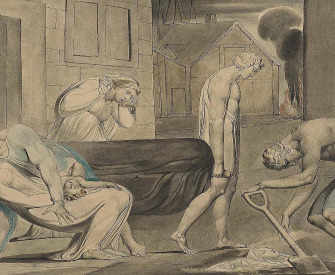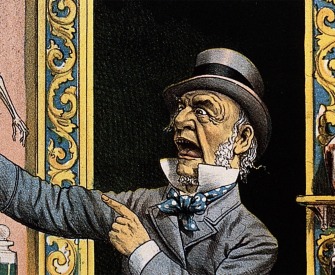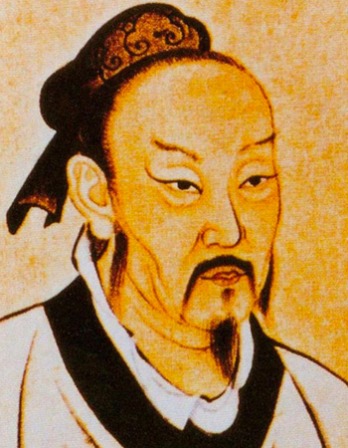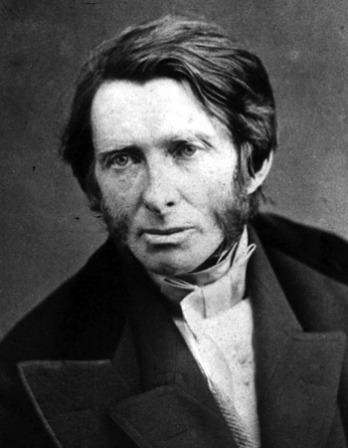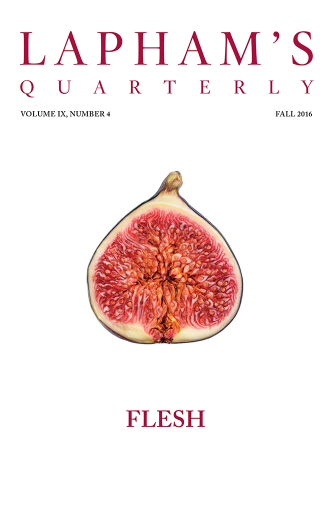If both what is before and what is after are in this same “now,” things which happened ten thousand years ago would be simultaneous with what has happened today, and nothing would be before or after anything else.
—Aristotle, 330 BCStrange Days
During convalescence it grows hard to tell the difference between when to pass the time and when to allow time to pass through.
By Sven Birkerts
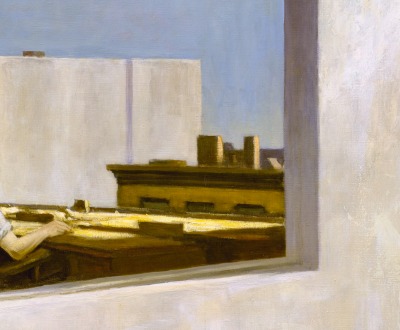
Office in a Small City, by Edward Hopper, 1953. The Granger Collection, NYC.
Things have gotten quiet these days, in a way they haven’t for a long time. It’s strange, like at some point there was another hand closing over my hand on the lever, pulling back to slow it all down—if not everywhere then at least here, in my place on the couch in the sunroom at the far back of the house, where everything has been set up to accommodate me. Extra pillows, bottles of water, the stage set for recuperation. All of a sudden, I am more still in myself than I can remember being in a very long time, so still that I can now just sit and watch the slow smooth sliding of the shadow through the room, which for extended moments I think of not as a gradual increase of dark but rather as an ebbing away of the light, a sensation like something being gently lifted, gently peeled back…
…extended moments—because those are what I have now, day after day, the succession of them marking the path back to being fully mobile, fully able, but on the way I have these near silences, the house ticking faintly on its old beams, the soft blurry purr of the refrigerator, little swirls of water through the pipes. How the feel of time changes when all the terms are altered. What on most days had moved with an almost hectic momentum, an ill-choreographed succession of one thing after another, one day just halted, causing the hours to then pool up behind it: the afternoon immobilized, with almost nothing to mark the change or confirm that this is not the world paralyzed into still life.
One day, another day, each day there when I open my eyes like something uncrated and laid out on all sides—to be assembled, no directions given, except of course that one thing will always follow another. You set the spoon down onto the lap tray and then ask yourself, What next? And if you are reflective, since you have the time, you think: how right that there is always a next thing. But you could also just sit and stare. It pulls at you, almost a challenge, a temptation: what if? What if I did nothing now but look here in front of me at the vase of these flowers, tulips, delivered at the door days ago (an event!), with a card from a former student—consider them, how they’ve started to droop on their stems, the petals losing that first waxy shine, the way they seem to measure the time in the room, and so it’s not so odd that I would think of the line from Keats, the urn, the “foster child of silence and slow time,” the reminder, there—and here—that in back of the obvious pulse that marks the outer day are these other measures, like the measure of the afternoon light on these tulips, and past them—out the big window—that faint but incessant twitching of the new leaves in the aspen.
Convalescence—means exactly what? I look it up. Con- + valescere: “altogether grow strong.” Gain health—simple enough. I am gaining back my health after a surgery, the right hip replaced, because finally there could be no more waiting. Everything hurt, I heard myself crackling like wicker with every movement I made. I was going up the stairs on all fours, like a dog. It was time. The operation was decided, scheduled. It would require deep anesthesia, the implanting of a titanium part, and then a designated period of recovery, a month or more of seriously curbed activity, daily painkillers, exercises to reinstate movements…
Three dots here, ellipsis, and in fact they are the punctuation proper to this whole surgery, and often enough apt to the convalescence as well—representing the sensation, at times drug-related, of a moment prolonging itself, taking on no defining inflection, connecting to the next moment only because the next moment is there to be connected to.
Everything was explained to me. I was told, step by step, what would happen. But the experience—from the morning of my going in for the surgery on—has been nothing like what I had come to imagine. I did not have the terms, the real terms. I could picture all of the separate components of what would happen, but I had no way of putting them together into anything that matched what I then went through. Not that I went through anything beyond what had been described—no part of that had been exaggerated or understated. But how can you warn a person about actual physical sensations, or about time, how it changes? Weeks before I went in I could already see myself there on the couch, set up with occupations; I could put myself in the room, tally up the hours of the day when my wife, Lynn, would be away working and I would be alone. I pictured with great accuracy the downstairs where I’m now confined—the couch set up on risers in the sunroom, bookcase right there in arm’s reach, the big dining-room table where I would spread my papers out, that whole afternoon atmosphere of a still life inhabited. But I featured the passing of hours without accounting for how they would feel. I had forgotten the great lesson of Thomas Mann’s The Magic Mountain, a novel I had lost myself in in my twenties. I had not remembered (because I had never really known) that illness—or in my case, waiting to gain back health—rearranges the world.
I think right back to the start of the strangeness, to the business of being out, being under, that step in the process that they explain so matter-of-factly, almost in passing. “After the anesthesia is administered,” the doctors say, as if they were setting out the simple schedule: “And in the morning, after breakfast…” I hardly gave it any thought either, at least in the weeks before the operation. But as the day neared, I began to realize what was involved, that I would be lowered down very close to the root of consciousness. The thought of it—the dread—was there with me all the night before. It was not dread of the surgery, the cutting into—though of course that was also on my mind—but the dread of the total blackout, the erasure. That an IV chemical would so deaden me to the world that I would not know that my thigh was being opened along a seam, that a major piece of metal (I had seen and handled the implant at a mandatory pre-op meeting) was being inserted…The idea gave me a pit in the stomach.
At the same time, though, it also pulled me, it fascinated. I have to say that images of such oblivion have always found their way into my fantasy life, I’m not even sure why. I know I have always been hyperattuned to those moments in movies when a character is rendered unconscious, after which—always—comes the briefest pause, a single beat or two of cinematic nothingness. And then the eyes snap open. He or she is in a hospital bed, being tended to, and everything that had happened before is erased by the image of white sheets and restorative sunlight streaming in through the window. That beat or two of nothingness is so powerful, that pocket of timelessness between A and B…Such unconsciousness suggests to me the possibility of some complete existential reset.
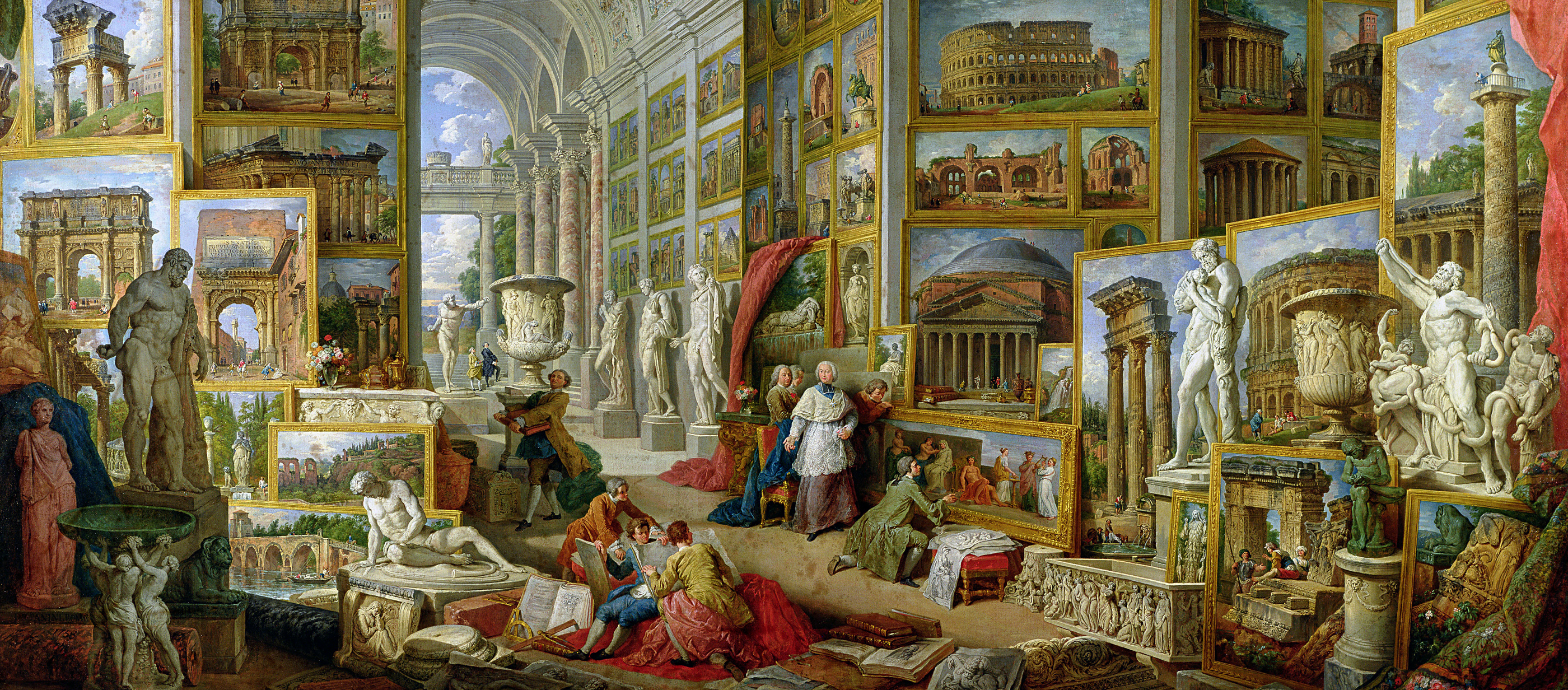
Gallery of Views of Ancient Rome, by Giovanni Paolo Pannini, 1758. Musée du Louvre, Paris.
So it happened—just as I had been told it would. I was in the room, alert through the IV hookup for the anesthetic. The anesthesiologist said I would be awake as I was wheeled into surgery, that there would be more drug given through a ventilator. But that’s where it all stops. I remember no wheeling, and I remember no sudden heaviness or drowsiness, no slipping away. I remember nothing. One minute I was on my back wearing a hospital johnny, the very next I was in recovery, by merest increments becoming aware that something important had happened to me, while still swimming in a pleasant chemical stupor…
In a sense, the last few weeks have been a continuation of that indeterminate state—the world drawing back, though really, I know, it is the self that has pulled away; the terms of attention completely altered, and all actions affected by that alteration. Is this what old age will be? I have to wonder. I study the changes. I, who have never taken pills of any kind, vitamins included, now find myself every morning laying out—and taking pleasure in doing so—a lovely long row of differently sized and colored shapes on a placemat in front of me. I’ve watched my parents doing this for years, but now I finally understand. Though the most minor sort of doing, this is, health matters aside, one distinct and symbolic gesture, a token ordering applied to what is now understood to be a vast undivided expanse of time.
The days—mornings and then long afternoons…People ask “How do you pass the time?” and though I usually answer glibly in the moment, I find myself getting stuck on the question when I’m alone. The words make less and less sense as I consider. The idea that there is this great intangible entity that we are all of us—the convalescing ones maybe particularly—passing through or in some way channeling through ourselves, and that this entity is somehow singular, as in the time. I know it’s a casual figure of speech, not a reasoned proposition, but all the more reason to ponder it. For it is in terms of the assumed and collectively accepted logic of such phrases that we live and take our basic bearings. “How do you pass the time?” suggests the basic model of existence, in which living a life is seen on the one hand as traversing an unspecified span of time—marked out in years—and on the other, as moving through the natural cycle of hours, from dawn to dusk. Time, then, is understood to be a medium one negotiates. And in this respect: how do I pass the time? Well, I suppose that I pass it in various ways—reading, writing notes, napping, taking walks, eating…And as it happens, each of these things gives me a different feeling about time. There is the sense of distended pause that I have when I am sitting in place, thinking or writing; and there is the more marked-off, syncopated rhythm of mailboxes and driveways and birds fluttering up into the trees when I go walking. And the almost otherworldly silence that comes over me in these rooms, when I just sit at the table and let the gaze pan from the corner all the way across—taking in the framed photos of the kids on top of the shelf, the bowl of stones gathered on the Truro beaches, the clay pitcher borrowed straight from a Morandi canvas, and then the big mirror on the far wall, which holds these same objects captive in its smooth silver depth. Mirrors create silence, I think. I make a note. Other afternoons I have that feeling that is like floating slowly through the air sometimes when I close my eyes and just listen to the sounds around me. These—and so many others—are the ways I pass the time, or ways that the time passes through me. They are also the different ways I am, and now I have to wonder what time even has to do with it.
The drugs, the painkillers, though mild in their effect, do make a difference. They introduce a set of new variations into the old picture. I take the little yellow pills at given intervals and I have quickly come to know their working. Though the time of the day might flow in these different ways, the cycle of medications sketches over that flow a grid of definite expectations, and these delineate the day, much as do meals, appointed times for exercises…I know that after just four hours, the effect of the little pill will start to wear off. I will feel heavier, more aware of the sore part of my body; I will notice, too, an unpleasant, edgy, gnawing sensation, and when this arrives the mind begins to cast around for relief. Too early for the pill—so says the plan—though I’m not above negotiating with myself, and at times I nearly capitulate. I invent a reason why this occasion, now, is a special case—but no, the logic of the slippery slope most always prevails, and I go looking for distraction instead. I decide to shave, and then arrange those CDs; I do a crossword and read for a bit. And what a sense of virtue I have after I have held out like this, resisted jumping the gun, when I can hold that merest dot of a thing on the tongue for a moment before washing it down. I do love the feeling, once it’s taken, that the cavalry is on the way. Just knowing that is a pill’s worth of ease.

B-52 Boneyard, Tucson, AZ, by Alex MacLean, 1991. Cibachrome print. © Alex MacLean, courtesy of the artist and Yancey Richardson.
And yes, as promised, there comes the moment when that craving edge drops away and the dull sense of the body fades. The body, I am suddenly aware, is fine. What I know is that I now have one especially good hour, a shiny hour, when I can park myself in comfort on the couch, blankets around my feet, warm light on just over my right shoulder. I can read, focus, or—better—write. My thoughts and words feel more synchronous; they have a capacity that they don’t necessarily always have for darting this way and that, taking little runs at things. I’m not sure how to describe it, this sense that the leash has gained some extra bit of elasticity, my slightly increased confidence that if I push this way or that way the phrases will be there.
And so I write, I try to write. Which is to say I enter into yet another relation to time. The one that is finally the best, the most gratifying of all. For though I can have this special merged sense for short intervals when I read—or certainly did in the past, before so much distraction supervened—it is really only when I am putting thoughts and impulses into words, when I am attuned to whatever is just then the right rhythm of expression, the live cadence, that I feel all sense of lapsing time fall away. Except I don’t feel it fall away, it just does. It’s as if I have, for a moment, broken out of the shell of that constant awareness, am free to take a look around.
This fine state does not last, of course. But it has not been so much of a change of state that it brings a crash after—nothing like that. Just a fading, an ebbing, the mind no longer quite so intent on muscling around. I feel the shift come in the language first—using words gets just that slight degree less pleasurable, and with that the first crack opens and the old sense of time comes leaking back in. Just that little bit, but it’s enough.
The convalescence is not at all times solitary, of course. The long afternoon eventually ends, and Lynn comes home from work and brings the world in the door with her—a feeling of different activity, an agenda for cooking and eating, bits of news and stories from her day. That mood that was many moods, but also all just the self in a room for hours and hours, dissolves. Now there is talk. Music. I sit on a high stool in the kitchen and busy myself peeling carrots or dicing an onion. It is not an easy or immediate transition. The long afternoon is become all bright lights, radio music. Lynn gives her account, but she also asks for mine. Which can be vexing. I have to figure out how to translate what has been a long and largely unmarked procession of thoughts and fancies into a narrative that somehow signifies. How to create the context and make the bridge; how to bring across the rhythm and duration of all that sitting and looking? Yes, duration is the right word here. How do I bring some essence of that state over into what feels like a completely differently structured kind of time?
In the presence of another—even if the other is in the next room and otherwise occupied—the reality of the solitude pulls away, just as in the heart of the solitude that other reality takes on a character of unlikeliness.
Finally, of course, there is the night. It has become unfamiliar and phantasmal during this period—and for this I blame the discomfort, the drugs, the new sleeping arrangement in our daughter’s old room. I can almost feel the different layers opening out one from the other, depending on the hour. Sleep, usually so ordinary, has become a kind of voyaging. I prepare for this even before I switch off the light. Some many phases, intervals. At different points I feel myself come awake. Sometimes I look at my watch, press the tiny button and see the hour light up—but in that moment my location on that grid connects with very little. I will have far more connection when the first birds start up, which they always do right at the touch of the first faint trace of light. Their warbling is a fantastic thing to listen to. What an indescribable state to be in, lying there, adrift, slightly awake, but merged enough in sleep that the bird sounds can somehow blend with the meander of thoughts and images in my head.
The layers of the night are in fact the layers of the self; they offer the most random unfolding of the accumulations of experience—everything that happened and mattered and lapsed away as the next new thing claimed the attention. There is no way to guess what will suddenly surface in those hours. At times I need only to call to mind a specific person, place, or event and the images will rear up, imbued with a kind of radiance of meaningfulness—as if this moment of return had been the point all along. And then, granted a single flash of what I know is the extent of the past, I think, There will never be time enough. How to reckon it all? Right then I understand, as if I truly had forgotten, why we will always need art. Writing. The slow and greedy embrace of language.
I’ve been on a calendar, but never on time.
—Marilyn Monroe, 1962Where else but in the dead of night do we encounter the extent of it all? Life—the sport of insomniacs. Because the soul needs the arching vastness of the night as well as the edgy hovering that sleeplessness delivers. It needs long unsettled hours in which to lay out the strands, one after the next, and then follow them out, letting the memories and meanings overlap and crosshatch until the full force of the uncanny comes sweeping in.
Awake in the dark, I engage with that other time—not the time of the sink’s faucet dripping or the blue jays tyrannizing the yard, but the long-term tangle of meanings and connections. This is a different world, not so often present to me in the light. Lying there, eyes open, I will feel that great swinging shift, foreground to background. The day world is obliterated: I find myself, as I did the other night, for no clear reason thinking of my old school friend Mark—of him, but really of his parents—how friendly they were: they would greet me so warmly every time I came by. On my back, eyes now closed again, I fix them with such a clarity, a distinctness, that it shocks me—after all, it’s been forty years. I’m wondering, almost anxious, did I give any like response back then to their kindness and interest? I’m wondering, too, if they are still alive. I try to imagine what they might be like if they are (and why not, I ask, my parents are alive)—and then sensations, little details, arrive: like Mark’s father’s peculiar bent-back thumb, and his mother’s amazing involvement with her cats, her way of whispering to them, fussing with them, even as she was talking to us, remembering along with that the looks Mark would give me as we walked out of the kitchen and headed to his room, the flick of the brows that said, “If only you knew”…All this so starkly real to me at three or four o’clock in the morning.
I’ve taken a pain pill. I’m lying here waiting to see if I can settle back into sleep. But now I have these people, and there is so much to remember about them. I realize I never gave them the thought they deserve. But have I given anything that thought? Because if there is so much here to do with these two people, what must there be of all the rest? I test myself. I cast around, I pick someone else, the manager of a bookstore where I once worked. And again, just like with Mark’s parents, I find the images—so clear—and then the layers. How quickly and smoothly they lift off, one from the next, until I am in a state of excited distress, thinking of the complete impossibility of bringing back what needs to be brought back. But it does need to be—otherwise all these things are just left for dead. Proust, that cork-lined room, it all makes sense. What could be more worthy, and rewarding, I think, than to give over the second half of life to the recovery of the first?
Later, again, sleep—unsettling dreams; I’m with odd groups of others and we are all together caught up in premises that defy any summary, that make sense only in the dream, and even then only just. As the eye converts one thing into another, instantly—pile of rags to sleeping dog—so the mind makes its little scenes from the random images thrown up by the psyche.
The bird sounds wake me. I move the curtain by my head and see the faint light over the yards…
The convalescence—which is what I call it when talking to others, never to myself—has been its own period, distinct from all other periods, an island I will always remember having been marooned on. There will be times, I know already, when I’ll find myself craving the intensity of so much uninterrupted self, for such looking and thinking. Don’t we turn back with some nostalgia to those sickbed days from childhood? Not just because we were cared for, indulged, but also because of how in that widening eye of time the blankets became entire landscapes, and great cloud caravans moved so slowly outside the window.
But it’s coming to an end, this interlude—I feel health gaining on me. There are a thousand little signs, from increased appetite to greater ease in making simple movements to, alas, less patience with the kind of daydreamy looking. Those lazy, horizontal meanderings, though I still indulge, are more and more trumped by the itch to be up and doing something. Another walk! I get my crutch—aware as I pick it up that soon I won’t be needing it—and make my way up the street. It feels good, the spring air, so much activity I can hardly take it all in—from the neighbor up on the hill bending over his hedge clippers to the two squirrels winding in some strange figure eights around the trunk of the maple, and all that song coming down from the branches and wires.
The crutch tip makes a satisfying punctuation, feels almost like I’m saying now, now, now…
